Exploring Fermented Foods in Dog Diets

Fermented foods have gained a lot of attention in recent years for their numerous health benefits in humans, but did you know that they can also be beneficial for our canine companions? Just like us, dogs can benefit from the consumption of fermented foods as part of a balanced and nutritious diet. In this article, we will explore the world of fermented foods in dog diets and delve into the essential aspects of canine nutrition and diet.
Understanding Canine Nutrition
Before we dive into the specifics of fermented foods, it’s important to understand the basics of canine nutrition. Dogs require a balanced diet that provides them with all the necessary nutrients to thrive. These nutrients include protein, carbohydrates, fats, vitamins, and minerals. A well-balanced diet ensures that your furry friend maintains optimal health, a strong immune system, and abundant energy.
Protein is a vital nutrient for dogs as it supports muscle growth and repair. Good sources of protein include high-quality animal-based ingredients like meat, fish, and eggs.
Carbohydrates provide dogs with the energy they need. Opt for high-quality carbohydrates such as whole grains, legumes, and vegetables to provide a sustainable source of energy for your pup.
Fats are an essential part of a dog’s diet and help support healthy skin and coat, as well as provide a concentrated source of energy. Include healthy fats like fish oil or coconut oil in your dog’s diet.
Vitamins and minerals are important for various bodily functions in dogs. Feeding a variety of fruits and vegetables can provide your furry friend with these essential micronutrients.
Dietary Needs for Different Life Stages and Breeds
It’s important to note that the dietary needs of dogs can vary depending on their life stages and breeds. Puppies, adult dogs, and senior dogs all have different nutritional requirements.
Puppies require a diet that supports their rapid growth and development. They need a higher concentration of protein, calcium, and phosphorus to promote strong bones and muscles. Look for commercial puppy foods specifically formulated to meet the needs of growing puppies.
Adult dogs have different dietary needs depending on their size and activity level. Small breed dogs may benefit from a higher percentage of fat in their diet, while large breed dogs may require diets with controlled levels of certain minerals to prevent orthopedic issues. Consult your veterinarian to determine the most appropriate diet for your adult dog.
Senior dogs often have lower energy requirements and may be prone to certain health conditions, such as joint problems. Choose a senior-specific diet that includes ingredients supporting joint health, such as glucosamine and chondroitin sulfate. Additionally, maintaining a healthy weight becomes important for senior dogs to avoid excessive strain on joints.
Exploring Fermented Foods in Dog Diets
Fermented foods offer a myriad of benefits for dogs when incorporated into their diets. The fermentation process breaks down food components, making them easier for your pup to digest and absorb nutrients. Additionally, fermentation produces beneficial probiotics, which are live microorganisms that support a healthy digestive system.
Yogurt is a popular fermented food that can be safely fed to dogs. However, it’s important to ensure that the yogurt is plain and does not contain any added sugars or artificial sweeteners. Yogurt provides dogs with beneficial bacteria that aid in digestion and promote a healthy gut flora.
Kefir is another fermented dairy product that can be beneficial for your furry friend. It’s similar to yogurt but has a thinner consistency. Kefir contains even more probiotics than yogurt, making it an excellent option for supporting your dog’s digestive health.
Sauerkraut is fermented cabbage and can be a great addition to your dog’s diet. It’s rich in nutrients and provides natural probiotics. However, be cautious of store-bought sauerkraut, as it may contain added salt or seasonings that can be harmful to dogs. Opt for homemade sauerkraut or seek out commercial options specifically designed for dogs.
Kombucha, a fermented tea, has gained popularity among humans and holds similar potential benefits for dogs. However, it is important to check the ingredients and ensure that it does not contain any harmful additives, such as caffeine or xylitol. Consult with your veterinarian before introducing kombucha to your dog’s diet.
Homemade Diet Options
If you prefer a more hands-on approach to your dog’s nutrition, homemade diets can provide excellent control over the quality and ingredients. However, it’s essential to ensure that homemade diets are nutritionally balanced to meet your dog’s specific needs. Consult with a veterinary nutritionist to create a homemade diet plan that meets all the necessary nutritional requirements.
When incorporating fermented foods into homemade diets, make sure to maintain a balance between the fermented foods and other essential nutrients. It’s best to introduce fermented foods gradually and monitor your dog’s response. Some dogs may experience digestive upset when introduced to new foods, so watch for any signs of discomfort or adverse reactions.
Note: Introducing new foods or making significant dietary changes should always be done gradually to give your dog’s digestive system time to adjust.
Remember, while homemade diets offer flexibility and control, it’s important to consult with a veterinary professional to ensure they meet all the necessary nutritional requirements for your unique pup.
Exploring the incorporation of fermented foods into your dog’s diet can provide a high number of health benefits, especially for their digestive systems. However, it’s essential to maintain a balanced and nutritionally complete diet that meets your dog’s specific needs. Always consult with a veterinarian before making any significant dietary changes or introducing new foods to your dog’s diet. By prioritizing their nutritional needs, we can provide our furry friends with the best chance for a long and healthy life.






